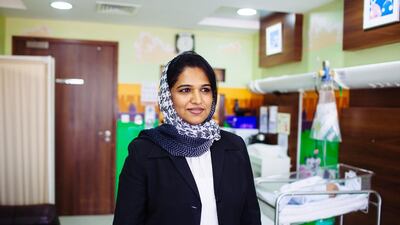ABU DHABI // Women serve as doctors, nurses and paramedics in the healthcare industry but not enough of them are taking up leadership positions.
Although the statistics are unavailable for the UAE, in the United States, women make up more than half of the workforce but they constitute only 21 per cent of executives and 21 per cent of board members at Fortune 500 healthcare companies. That is according to a study by venture fund Rock Health.
Alisha Moopen, Aster DM Healthcare’s chief executive of GCC hospitals and clinics, said there could be a similar disparity in the UAE.
”In the UAE, we are heading in the right direction, but we still have much to achieve,” she said.
“We need women to advance fast enough to meet the current and future needs of health care.
“That being said, I do think we have many sociocultural barriers to break and more gender-equality bridges to build.
“I do believe that women in the healthcare space regionally have yet to be encouraged, promoted and included in executive positions to unlock their true potential.”
Dr Shanila Laiju, chief operating officer for the Medcare group, said many women faced the challenge of balancing work and family life. “People take a break when they’re planning a family but this should not stop women from working. Have faith in yourself. Take chances even if you fear,” said the 45-year-old Indian expatriate.
Dr Laiju studied dentistry in India but became a hospital administrator after starting a family. She believed that would allow her to spend more time with her family.
“I got married and had two sons and I was doing my role as a mother,” she said.
In 2003, after a four-year hiatus, Dr Laiju took a supervisory role at an Aster clinic.
“It was not easy, as I had to start from scratch. I took up roles as a receptionist, cashier and in insurance to learn what was happening in the clinic,” she said.
Three years later she was promoted to work at Aster Hospital. “The hospital was very small at that time and had only 14 beds. It was really a challenge, as there were many operational difficulties,” she said.
She quickly rose through the ranks and was appointed hospital administrator in 2006 before joining Medcare in 2008.
In 2012, the Medcare group made her its chief operating officer.
Malvika Varma, Burjeel Hospitals’ director of human resources, said about 74 per cent of its female staff were either doctors, nurses or paramedics.
“Women in leadership position remain a minority in the workforce, especially in the private sector,” she said.
“Having more women representation in the senior management will ensure that the voices of women are heard and that the organisational policies are influenced in a manner that makes it conducive for women to render the services through the varied roles and responsibilities that they hold.”
Burjeel Hospitals has a programme to train female employees for senior management roles and leadership positions.
Bader Saeed Hareb, Dubai Healthcare City’s chief executive of investment, said having women in leadership positions was “fundamental to our growth”.
“We believe in a diverse work culture, therefore the female voice is equally important to its male counterpart in developing policy, leading change and guiding healthcare delivery in the free zone,” he said.
Mr Hareb said women comprised 55 per cent of his company’s 300 staff members and 20 per cent of senior managers.
arizvi2@thenational.ae






